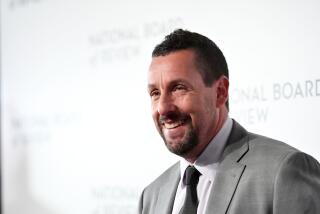‘Bad Lieutenant: Port of Call New Orleans’
“Bad Lieutenant: Port of Call New Orleans” is not a remake of, or a sequel to, “Bad Lieutenant,” as the people involved with both movies have taken pains to point out.
When Abel Ferrara, who directed the first “Bad Lieutenant,” heard that the iconic title of his 1992 film was being repurposed for a 2009 project directed by Werner Herzog, starring Nicolas Cage and produced by Ed Pressman (one of the producers of the first movie), the Bronx-born auteur did not mince words: “I hope they’re all in the same streetcar and it blows up,” he said. Herzog, for his part, retorted that he had never seen the original film nor even heard of Ferrara.
It’s true that the two films don’t even seem to belong to the same genre: Ferrara’s movie, infamous for its full-frontal nudity, violence against nuns and traumatized schoolgirls, is a serious (and seriously tortured) spiritual drama. Herzog’s, despite the crime-procedural trappings and high sleaze factor, is a wild and giddy comedy, with singing iguanas.
But there are obvious points of contact and the movies do make for an intriguing (if exhausting) double bill. Both revolve around a junkie rogue cop whose lurid downward spiral takes place in a Sodom-like fallen world: Ferrara’s in pre-Giuliani New York City (the stamping ground of all his best movies), Herzog’s in post-Katrina New Orleans (a location selected for the tax breaks as much as for the apocalyptic atmosphere).
Both are showcases for heroic, borderline-grotesque Method acting that more inhibited, less committed performers would never think to attempt and that most directors would simply not allow. “Bad Lieutenant” (issued last year in a special-edition DVD by Lionsgate) features Harvey Keitel in perhaps the finest role of his career, one of the rawest and (in more ways than one) most naked screen portraits ever of existential anguish. In “Port of Call New Orleans” (out on DVD this week from First Look Studios), Cage takes a page not from Keitel but from Herzog’s old buddy Klaus Kinski, scaling the heights of raving, ranting, vein-popping lunacy.
Like many of his films, Ferrara’s “Bad Lieutenant” is above all concerned with sin and redemption. Keitel’s unnamed lieutenant, a lapsed Catholic, pockets drugs from crime scenes, shakes down crooks for drug money, bets recklessly on the World Series and engages in sundry debauchery with a vast cross-section of New York City lowlife -- all before finding the opportunity for salvation while investigating the case of a young nun who was raped at the altar.
Slapped with an NC-17 rating, “Bad Lieutenant” was instantly notorious, and you can see why the producers of the new film would try to exploit the name-recognition factor with their cumbersome and nonsensical title. The script for “Port of Call New Orleans,” credited to William Finkelstein, a veteran of TV cop shows including “ NYPD Blue,” is composed almost entirely of genre clichés, from the plodding murder investigation to the call-girl love interest ( Eva Mendes).
The story, in any case, is strictly secondary to the eccentricities of the star and the director, who has a ball dreaming up the protagonist’s drug-induced hallucinations; besides those unforgettable iguanas, which Herzog himself has declared the best thing about the film, they include a breakdancing ghost.
Ferrara and Herzog are both connoisseurs of extreme behavior, and Keitel and Cage are actors who, in good roles and bad, often risk going too far. Restraint is the wrong word (especially for Cage), but the performances are more thoughtfully calibrated than they might first appear: Keitel’s character is not just monstrous but believably tormented, and in Cage’s case, there is some nimble slapstick comedy amid the insane acting out.
Significantly funnier than most movies that bill themselves as comedies, “Port of Call” is hard to dislike or, for that matter, to take seriously. But if it transcends exploitation, it’s for more or less the same reason that the first “Bad Lieutenant” was so brilliant: a director and an actor working in perfect harmony and without a safety net.
More to Read
Only good movies
Get the Indie Focus newsletter, Mark Olsen's weekly guide to the world of cinema.
You may occasionally receive promotional content from the Los Angeles Times.






